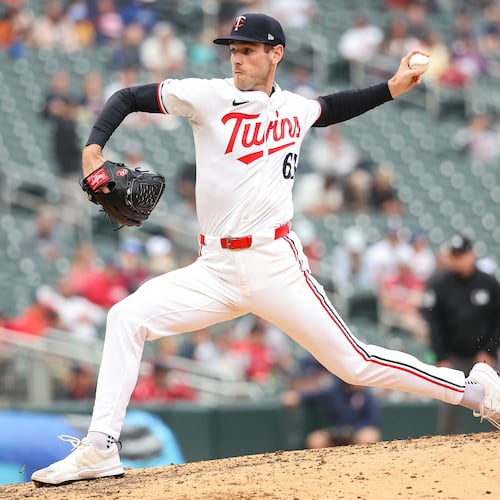Given a chance to put their nemesis to sleep, the Washington Nationals arrived at Turner Field on Friday and trailed by a touchdown at halftime. (Actually by seven runs in the bottom of the fifth.) The famous Stephen Strasburg, who’d never yielded more than two homers in a game, was touched for four in five innings. A Braves team that hadn’t won in 10 days needed only a sniff of #Natitude to turn into #MurderersRow.
Friday’s victory marked the Braves’ 25th in 34 games against the Nats since Aug. 22, 2012. That’s a winning percentage of .735, which is so outrageous as to defy rational explanation, even by the man who manages the team doing the dominating.
“It’s not like we make a ‘Win-One-For-The-Gipper’ speech before we play them,” Fredi Gonzalez said, speaking Saturday. “I don’t change the rotation around to get better matchups.”
No. His team just shows up and plays, and invariably it swats the Nats. On their 0-8 West Coast swing, the Braves appeared to run out of ideas; they came home to face the Nationals, which is the one trick that usually never fails. Saturday’s affair, delayed three hours and 41 minutes by rain, became the exception, though it did take Washington 11 innings to score the winning run in a game that ended at 2:29 a.m. Sunday.
The series began with us wondering if the Braves, having fallen 4 1/2 games back in the National League East, were done. After Friday’s game, the burden of proof had been thrust back on the Nats. They won 98 games to take the NL East in 2012, a season remembered for the September shutdown of Strasburg and subsequent playoff collapse against St. Louis. They were the preseason favorite to win it all in 2013, outgoing manager Davey Johnson even dubbing the year “World Series or bust.” To the merriment of many, the Nats finished 10 games behind the Braves.
This year has seen more undulations. Washington fell four games behind the Braves in April and saw regulars Ryan Zimmerman, Adam LaRoche and Bryce Harper lost to injury. All three returned — Zimmerman has since been reinjured — but Harper caused a stir on his reappearance by suggesting that manager Matt Williams hadn’t deployed the correct lineup. (Harper seemed to suggest that center fielder Denard Span should be benched.) This week Williams bristled when it was suggested that Harper, whom he earlier chastised for a lack of hustle, might be sent to the minors.
This prompted Mark Mulder, once a pitcher and now an ESPN commentator, to say, according to the Washington Post: “I almost feel like this team’s kind of done it to themselves with the whole Strasburg thing, shutting him down a few years ago. It just feels like there’s always drama. … Whether it’s Harper’s comments about the lineup, no matter what it is, there’s just always something that this team is dealing with.”
As is his custom, Strasburg spit the bit against the Braves on Friday. In his previous four starts at Turner Field, he had: Exited after three innings because of 106-degree heat; exited after six innings with forearm tightness; exited after two innings with a strained oblique and been ejected in the second after throwing two pitches behind Andrelton Simmons. Now this latest debacle, which Williams sought to explain Saturday: “The guys over in that clubhouse (meaning the Braves) have power, and they really feed on mistakes.”
Of Washington’s 25 past losses to the Braves, 13 were started by Strasburg and Gio Gonzalez, who in 2012 were considered two of the best pitchers in baseball. As fate would have it, the Braves were scheduled to face both this weekend — and to miss Doug Fister and Jordan Zimmermann. The Nationals are 2-6 in Strasburg’s past eight starts against the Braves; they’re 0-7 in Gonzalez’s.
As one Brave said, speaking of Strasburg: “He’s really good, but we feel good against him.” The same could be said for the team’s attitude whenever they confront the ballyhooed #Natitude. The 2014 Braves probably couldn’t win any other division in baseball; because they own the Nats, they have a shot in the NL East.
Indeed, the Nationals have been frustrated so often in this ballpark that they took heart from Friday’s narrow loss, in which they drew within a run before succumbing. “It would have been easy to fold the tent,” Williams said. “(To rally) says something about our club … It didn’t go our way, but the fact that we made it a game was important to us.”
And that, on this storm-tossed August weekend, is how things stood: The Nationals took pride for coming close against a team that had lost eight in a row. Technically the Braves are chasing the Nats, but sometimes it feels the other way around.
About the Author
Keep Reading
The Latest
Featured


